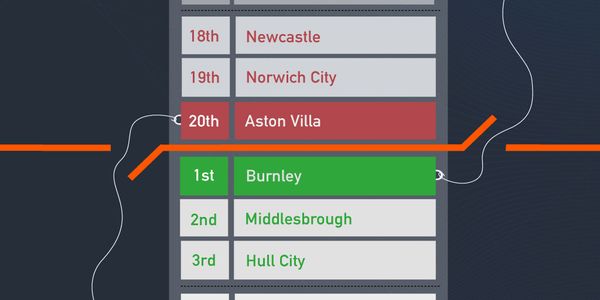It might be obvious to say that soccer teams struggle with the jump in quality after winning promotion. However, being able to quantify those struggles could be beneficial to bettors. Analysing newly promoted teams’ results against “better quality” teams in a higher division could highlight odds discrepancies and provide a valuable betting opportunity. Read on to find out more.

In terms of the top five leagues in European soccer, three teams are relegated (lose their place in the league) and three are promoted (move up from the league below) at the end of each season. The German Bundesliga is unique in this respect as it uses a playoff system to determine the third relegation and promotion place.
How often is a team relegated after promotion?
Using data from the previous six seasons in the top five leagues in Europe (Premier league, La Liga, Bundesliga, Serie A and Ligue 1), we can see how big the difference in quality is from the first and second division in each league by looking at how often a team is relegated within three seasons of being promoted.
The above table highlights how the disparity in quality between two divisions can vary depending on the league. With only 16.66% of teams being relegated within one season of playing in La Liga, it could be said that the Segunda B division is much more closely matched to La Liga than the second tier of German soccer is to the Bundesliga (41.66%).
Newly promoted sides have notoriously struggled to compete in the top tier of English soccer (only 44.5% have survived more than three seasons in the last six campaigns) but the Serie A appears to have an even bigger gap in quality (only 38.89% have lasted more than three seasons).
It is also interesting to note that only once in the last 15 years have all three newly promoted sides stayed in the Premier League in their first season (QPR, Norwich and Swansea in 2011/12).
How often do promoted teams defy the odds against elite teams?
Once a team wins promotion to the top division in their country, the chance to play elite teams becomes an exciting prospect for players and fans alike. However, newly promoted teams often struggle to pick up points against these elite teams.
Is there always value in betting on the elite teams against newly promoted sides? How often do these newly promoted team prevail as underdogs? Let’s see what the numbers suggest.
Using the same sample of data as above (2010/11 - 2015/16), we can use the Premier League as an example to see how newly promoted sides perform against the elite teams (top six teams from the previous year) compared to other teams in the division.
While the data analysed from performances against the elite teams is a much smaller sample size, it is still indicative of newly promoted teams struggling with the gap in quality between two divisions - a 0.70 PPG and 20.39 win % differential average
It could be said that while three teams are promoted at the end of each season, it doesn’t mean to say they will all cope with the demands of playing higher quality opposition in the same way - this is highlighted by the fact that some teams have picked up just 0.08 PPG against elite teams (Hull in 2013/14) and others as much as 1.00 PPG (Swansea in 2011/12).
How can the struggles of a newly promoted team benefit bettors?
It is not uncommon for bookmakers to underestimate the newly promoted teams’ chances of a win and offer the elite teams at higher odds than they should be. This gives bettors the opportunity to use the above data to get an advantage over the bookmaker.
Simply compare the implied probability of a newly promoted team beating a team that finished in the top six the previous year against the actual odds offered, find a discrepancy and bet when there is value to be had.
How do you know when a team will compete after promotion?
On the whole, newly promoted teams do struggle when playing in a higher division. Even if they survive more than three seasons, it can take years to challenge those that consistently finish in the top six each year. So how have teams like Leicester City and RB Leipzig bucked this trend?
To find value bets, compare the implied probability of a newly promoted team beating a team that finished in the top six the previous year against the actual odds offered.
In order to compete with elite teams after winning promotion, teams have to take a risk. Finances now reign supreme in modern soccer and if a team gambles on winning promotion and it backfires, the consequences could be catastrophic. However, if they find the right balance they have the secret to success.
Teams that invest in the quality of players that would help them compete in a higher league and don’t win promotion would face insurmountable debts. Alternatively, they could wait until after they are promoted to invest in those players and then hope the squad gels and performs straight away. Teams like Leicester City, RB Leipzig and Eibar have steadily invested and evolved to move up from the lower leagues in their country to compete with elite teams.
MORE: TOP 100 Online Bookmakers >>>
MORE: TOP 20 Bookmakers that accept U.S. players >>>
MORE: TOP 20 Bookmakers that accept Cryptocurrency >>>
Source: pinnacle.com
